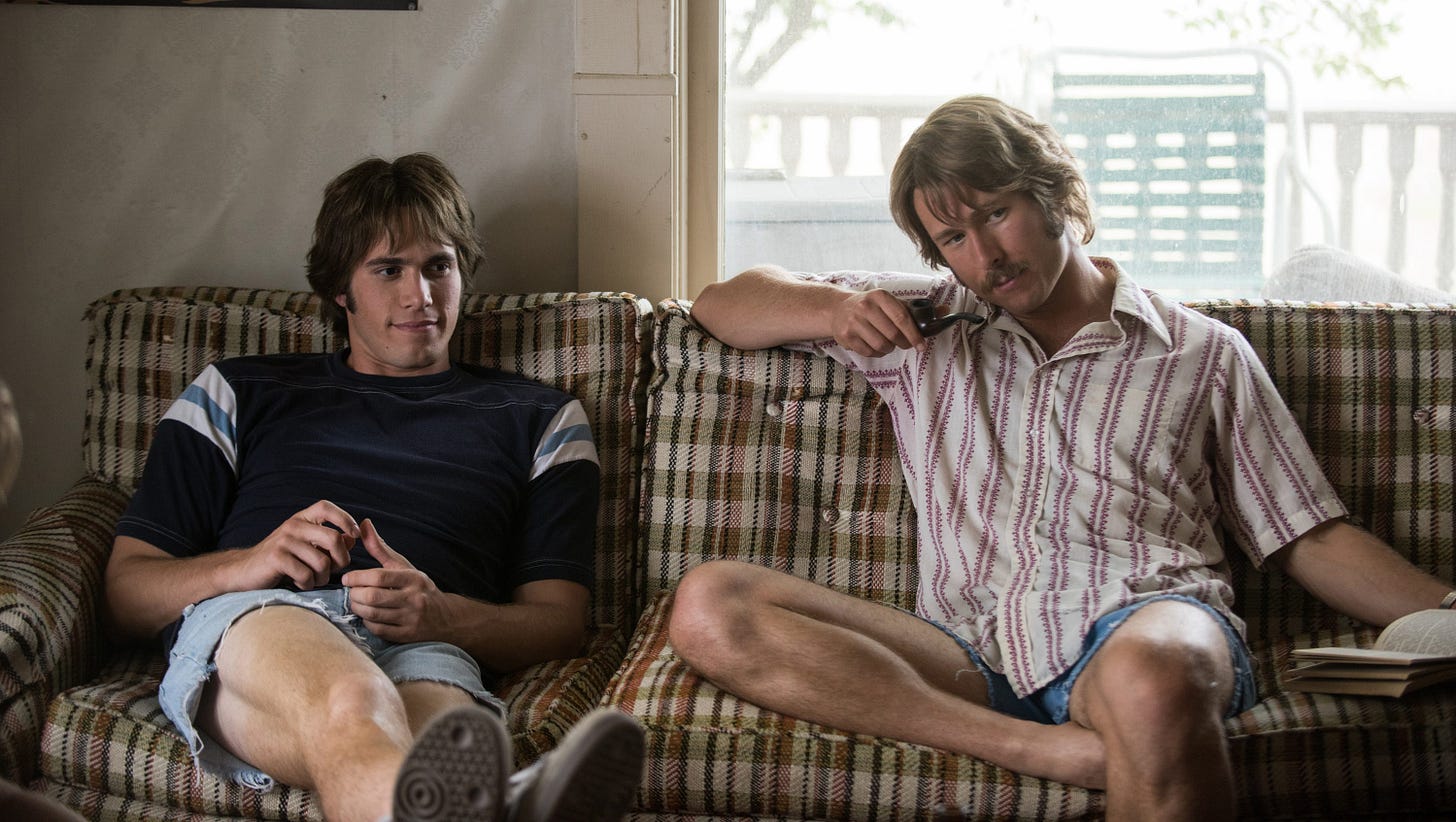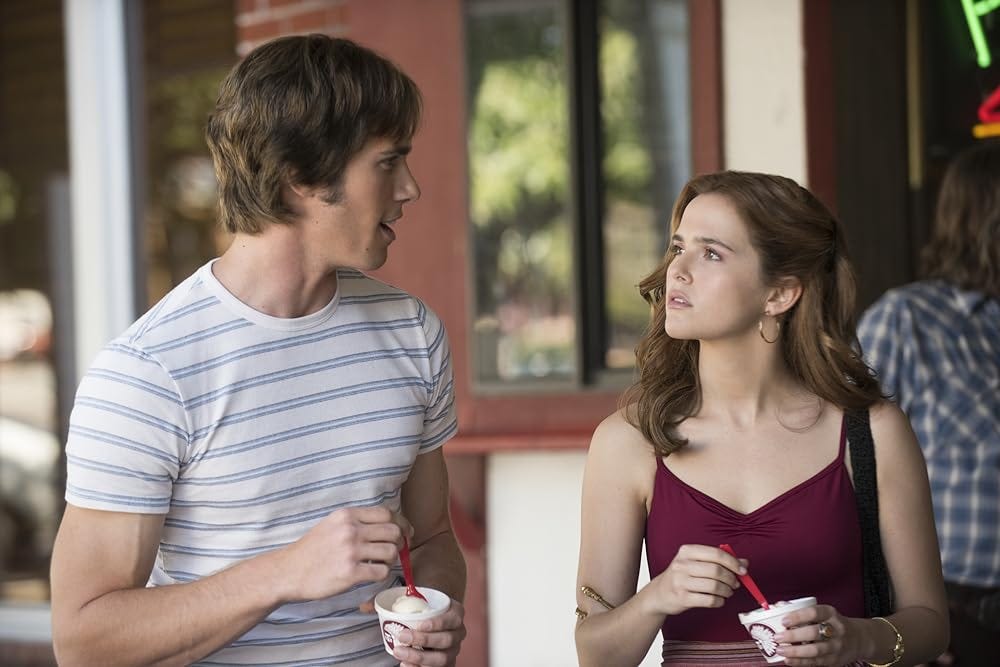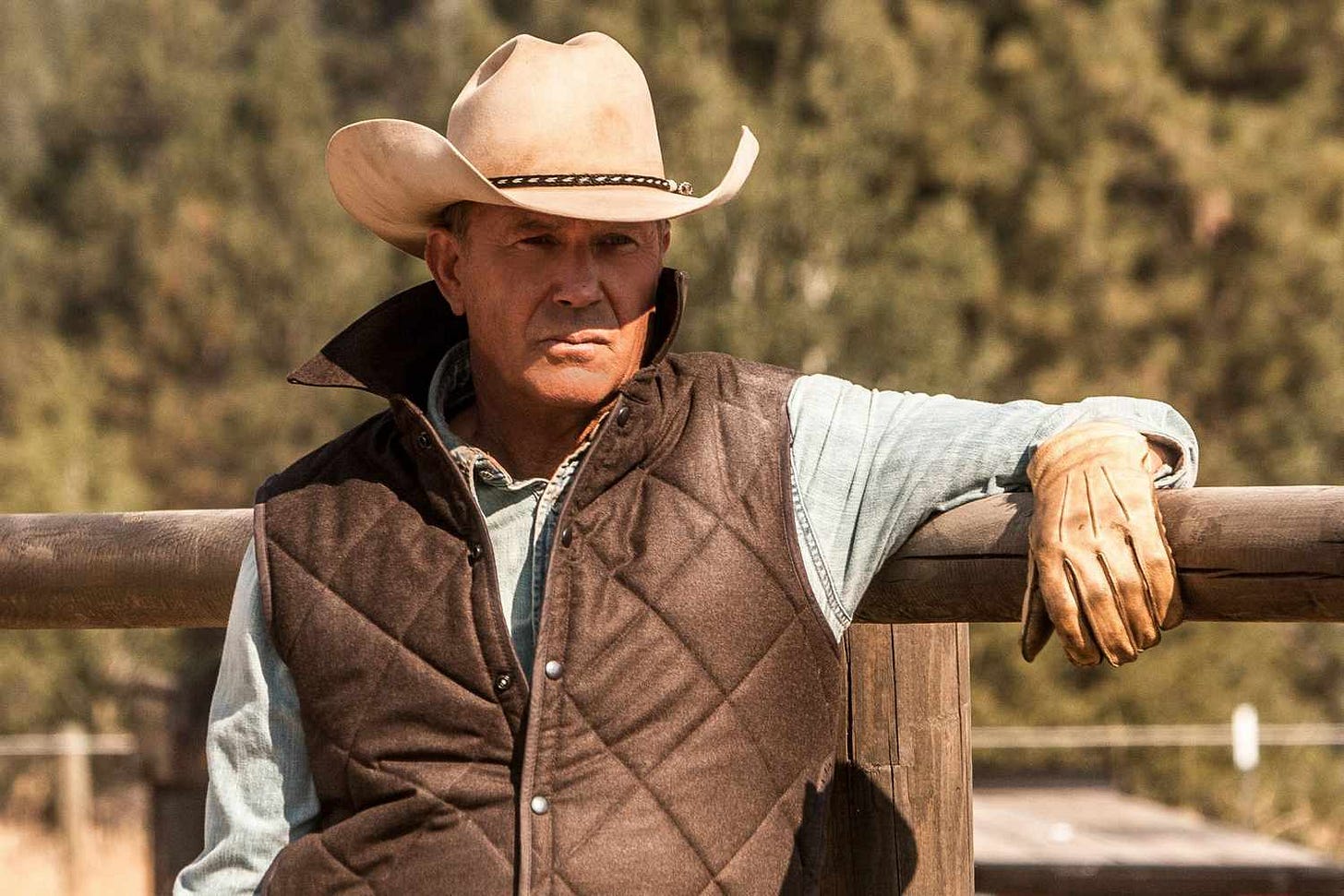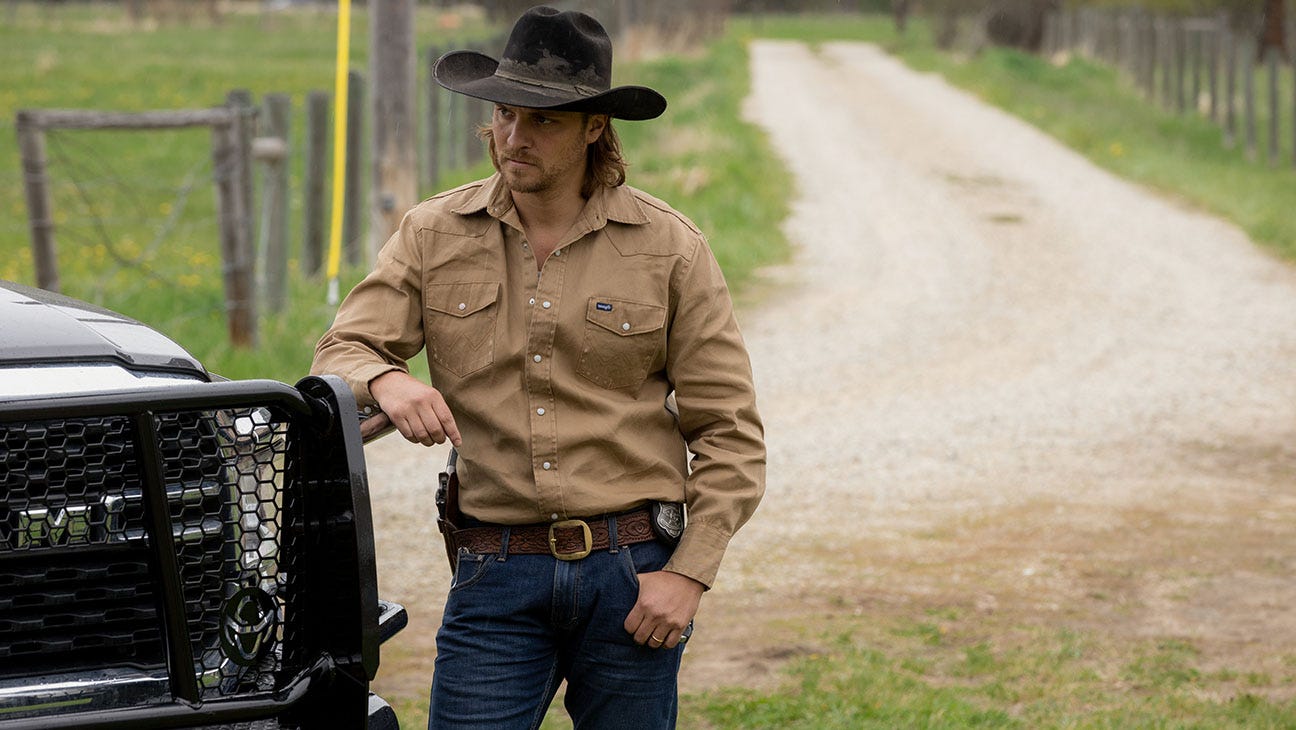The Off-Balance Variety Show: February 2025.
Vengeance, baseball and A Tribe Called Quest.
Here we are, with February just about in the review mirror. I hope you all had a great month, whatever your metric.
To that point, here is some of what I watched, listened to and (generally) enjoyed over the past few weeks, all that which I haven’t covered before.
Though if you’re looking for January’s edition? You can find it here.
As always? Thanks for reading Off-Balance!
Ryan.
Movies
TV
Music
Everybody Wants Some!! (2016)
It isn’t breaking any new ground to suggest Richard Linklater is a filmmaker who is attuned to the moment-to-moment experience of the human condition in a way that is unique amongst his contemporaries.
Maybe it is something inherently more minute, grounded (Dazed and Confused, SubUrbia, Boyhood) or the relatively (in comparison) more fantastical (The Before Trilogy, Apollo 10 1⁄2, Waking Life). But either way, the passage of time and it how informs the collective identity has, easily, been his strongest operating mode.
With 2016’s Everybody Wants Some!! however, which he both wrote and directed, it is see Linklater try to exist in something of a middle ground between these styles, as one follows what is, in essence, a spiritual successor of sorts to Dazed and Confused. A quasi-ensemble piece that tracks a party-fuelled three days of a Texas baseball team in the lead-up to the start of their college season, in the late summer of 1980.
Easy-going and exploratory yes but compact, too.
When freshman pitcher Jake (Blake Jenner) arrives on campus, at the general bottom of the ladder though he may be, he is quickly brought into the team’s fold by veterans McReynolds (Tyler Hoechlin) and Finnegan (Glen Powell) who help to tutor him on their various ins-and-outs as he quickly settles in.
Practically speaking, this amounts to a weekend-long bender as the team bonds and bickers in equal measure, through a never-ending haze of booze, sex and copious amounts of pot (as is the custom).
Meanwhile, Jake catches the eye of Beverly (Zoey Deutch), an arts major, who comes to challenge the team’s perceptions on culture and comfort zones beyond their well-crafted bubble.
The period-era details are sharp, the actors are clearly having an absolute riot and although the film only boosts one actual baseball set-piece, for anyone who has operated in that space (or any one similar), those duelling elements of camaraderie and competitiveness are immediately apparent.
The trouble is, while his beat-by-beat plotting is solid, save for some scattered pacing, Linklater’s thematic work here reveals a startlingly juvenility: not entirely misplaced given the nature of the material he is presenting but undeniably out-of-step with the general arc of his career and previous efforts.
With no real interiority or sense of reflection, the film’s main characters are surface-level at best and veer into masculinity-driven, ego-bruised misogyny (the men) at their worst.
Oddly though, while Linklater wants to critique them for this, he only does it at a safe distance, where it won’t much land.
They do, to be fair, undergo some amount of change but by the end, it doesn’t feel as though any of it will actually stick nor resonate once the credits roll - and if it doesn’t, they’re static regardless (both Jenner and Deutch’s characters, while played well, don’t evolve whatsoever).
By design, young people, struggling through legitimate personal growth during a traditionally transformative period?
Perhaps.
Within its very openly comedic set-up, the film clearly wants to be a fun, nostalgia-driven throwback to an era of personal fondness without really prodding at the thematic, emotional framework it puts forward (for some context, both Linklater, at Sam Houston and star Hoechlin, at Arizona and Irvine, played college ball).
But it does put those things forward and therefore, it is than beholden to a certain sense of responsibility it struggles to face head-on.
Never what it could be nor never what it fully wants to be either, Everybody Wants Some!! leaves an aftertaste that which, while not totally unpleasant, speaks to a consistently uneven, nigh-immature effort.
In opening itself up, paradoxically, it boxes itself out.
Rating: 5.8/10
Hunters (Seasons 1 & 2) (2020 - 2023)

Pairing the complementary styles of grindhouse cinema and ‘70s comic pulp, while also working to adapt a measure of very real history under its fictionalized umbrella - Hunters could have easily collapsed under its own weight.
And though it isn’t immune to some feeling of whiplash because of those stylistic decisions, the show does have a clear confidence in its material that is present right from the very beginning.
In 1977 New York City, after the seemingly random murder of his grandmother Ruth (Jeannie Berlin), gifted but somewhat aimless Jonah Heidelbaum (Logan Lerman) is greeted by a man who introduces himself as Meyer Offerman (Al Pacino), a well-known philanthropist.
Offerman tells Jonah that he is a Holocaust survivor, having first met Ruth in Auschwitz, decades prior.
Though upon later immigrating to America, they uncovered a seemingly-impossible series of secrets. Through the Operation Paperclip initiative, the US government brought German scientists and other operatives, some of them with explicit Nazi ties, into the country en masse, where they rapidly infiltrated near every level of society, including the highest reaches of politics.
Concurrently, spearheaded by the efforts of sociopathic Neo-Nazi Travis Leich (Greg Austin) and a woman known, at first, only as “The Colonel” (Lena Olin), after decades of plotting, many of those Nazis are on the cusp of reasserting themselves by establishing a “Fourth Reich” in the US: all while coming under investigation by determined FBI agent, Mille Morris (Jerrika Hinton).
So in response, Ruth and Offerman formed a vigilante group they dubbed “The Hunters” who systemically track down and eliminate every Nazi they can.
Offered his grandmother’s post within the team, Jonah accepts and quickly finds himself forced to confront the atrocities of history’s most barbaric evil, as he grapples with both his heritage and humanity.
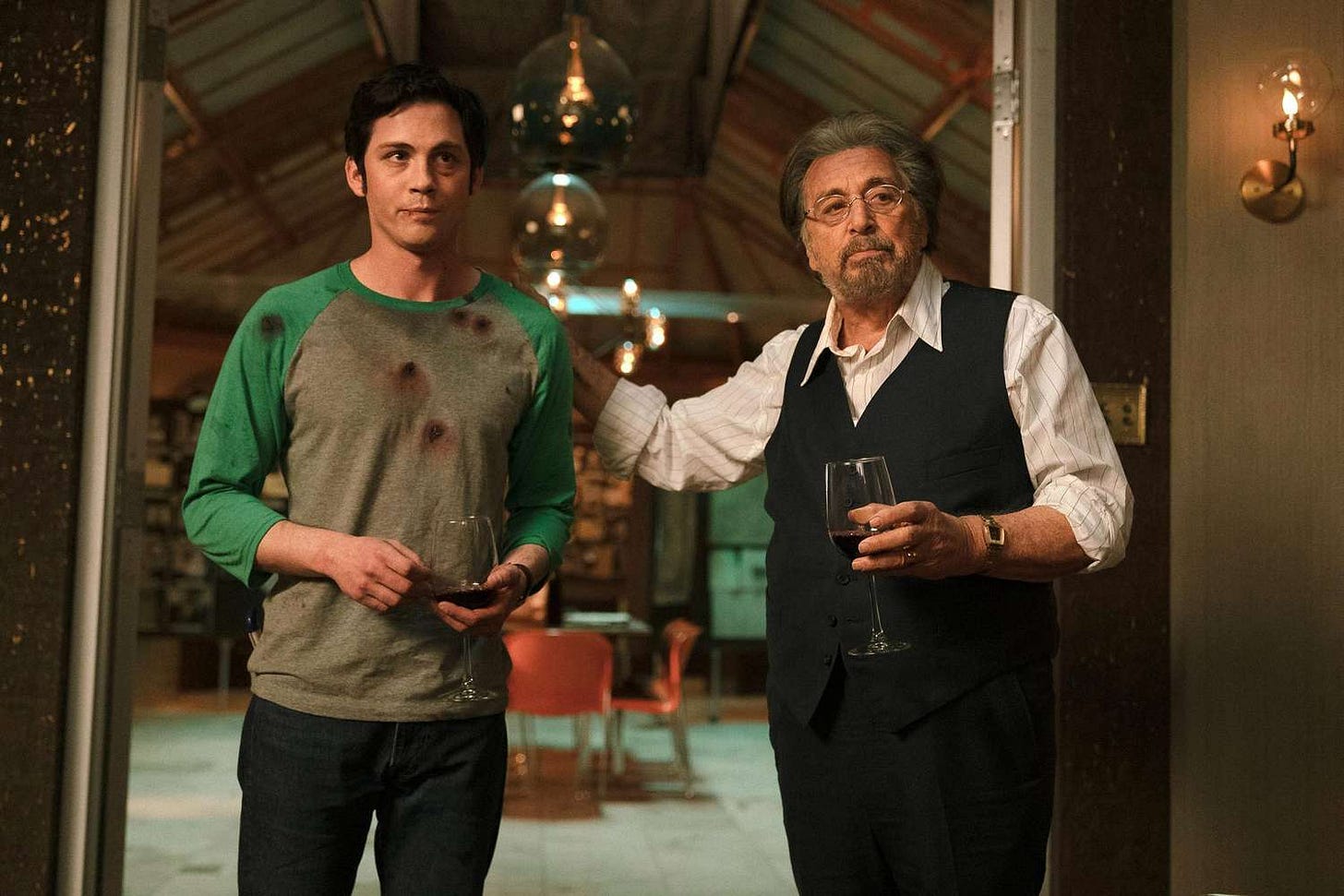
Functionally, Hunters first season doesn’t much break from the relatively routine structure for a production of its specific inclination.
Flashbacks peppered throughout help to provide some light backstory to its supporting ensemble, while, episode-to-episode, the Hunters carve their way through the Nazi-in-hiding ranks, not without setbacks, as the larger narrative diligently moves its pieces into place.
Never predictable to the point of being monotonous but overall, not bending its storytelling parameters too far, either (save, naturally, for the final stretch).
As expected, the primary focus is on Jonah as he more-or-less comes of age, being initially overwhelmed before hardening into a committed solider. Despite the inherent comfortability present in its beats, this arc, alongside Jonah’s evolving dynamics with his fellow Hunters is delivered effectively and is entertaining front-to-back (though not without some sense of protagonist-audience-stand-in-inaction). Hunters banks quite a bit on the sheer catharsis of seeing Nazis meeting their deserved end, beyond that well-worn familiarity but it reaches the best of its narrative highs because of it.
The second season, in comparison, takes far bigger swings both conceptually and with its delivery.
Set two years later, it picks up with the team dealing with fallout, on various fronts.
Jonah, now based in Paris, is hunting Nazis solo while a parallel plot-line follows Offerman, who has been revealed to be not all that he appears.
But when Jonah crosses paths with his great-aunt Chava (Jennifer Jason Leigh), who is a Hunter herself, they bring the team back together, from Europe to the far reaches of South America, in what will be their most dangerous mission yet.
In working to present so many different storylines, by default, Hunters’ second season breaks away from the occasionally formulaic approach that coloured much of its predecessor.
Good in theory but it also feels far too messy, scattered in its pacing and ultimately, unable to truly carry everything over the finish line effectively with the proper energy, given the sheer weight of its narrative supports (in what was, evidently, the show’s finale).

And as is the case for Hunters’ overall, there is a push-and-all between its various thematic and stylistic nodes that never completely settles. Not quite Inglourious Basterds but not entirely a consistent drama-thriller, either.
Notably, the show was roundly criticized by the Auschwitz-Birkenau State Museum, who deemed it “disrespectful and dangerous” to the memories of Holocaust victims and survivors, in the way its chosen material was presented, as did then-director of the USC Shoah Foundation, Stephen. D Smith, who called for the show to be cancelled.
Creator and show-runner, David Weil, himself the grandson of Holocaust survivors, acknowledged these concerns during the show’s run in numerous statements, as he brought his various thematic pieces together. Allegory, exploration of identity and power-fantasy thrice, while also depicting the cruelty and inhumanity of Nazism head-on, that historical-fiction overlay considered:
If the larger philosophical question is can we ever tell stories about the Holocaust that are not documentary, I believe we can and should. Hunters, like a myriad of acclaimed films on the subject, does not always adhere to literal truth in its pursuit of capturing the representational truth of the Holocaust. My decision to fictionalize was made in awareness of this debate, and this show takes the point of view that symbolic representations provide individuals access to an emotional and symbolic reality that allows us to better understand the experiences of the Shoah and provide it with meaning that can address our urgent present.
- Hunters creator and show-runner, David Weil.
Now, that isn’t to say that the voices of the show’s most important critics don’t carry weight because they do, of course.
The performances are uniformly strong, it lands as period-effective historical fiction and all the auxiliary elements (the set design, soundtrack, costuming, etc) are solid.
But while Hunters is abundantly clear its messaging, not shrinking away from the truth of the Holocaust nor its very-real modern-day parallels (especially as it relates to the rise of anti-Semitism and fascism in the socio-political scene, both in America and more globally) it can be inconsistent tonally, existing on this serious plane, in addition to its dark comedy, action-oriented leanings: those, which can be unquestionably more mixed and at times, contrast poorly.
Though the minute of its execution or presentation, Hunters is and will be divisive, well-made in its creative voice though it may be.
Season 1 rating: 7.7/10
Season 2 rating: 6.6/10
Hunters, overall rating: 7.3/10
Yellowstone: Season 5 (2022-2024)
If ever modern streaming-access television could provide a more striking duality, it will be hard-pressed to top the competing nature of Yellowstone, both as it existed as a broader cultural talking point and the experience of actually watching the show, particularly in its later seasons.
Created, ran and primarily written by actor-turned-screenwriter-director Taylor Sheridan, right from the jump, the prestige Yellowstone was shooting for was evident, a Neo-Western crime drama in a Gilligan-esque vain.
The Dutton family, led by patriarch John Dutton (Kevin Costner), continually besieged on all sides by uneasy allies and foes both as they try to maintain control over their Montana ranch, while raging against the creature comforts of the modern world.
And no, it never reached that clearly hoped-for benchmark, even at its best, more Dallas-lite than anything else.
Too schlocky and more cowboy soap than serious crime drama. Riddled with blatant, pro-corporate product placement and far too obnoxious in the weak-posturing of its demographic-targeted messaging (the fall of the Western world! It’s all on the vegans, Californians and those darn cell phones… whatever, dude).
Though if one could say anything about Yellowstone’s first two-three seasons is that, even with those legitimate, eye-roll inducing criticisms, the show was goofy fun, a ratings juggernaut even, in spite of itself.
The Duttons, scrambling to keep the walls from closing in however they could, in increasingly desperate attempts to hold onto their way-of-life. From politically strong-arming members of their own family, to straight-up murder as their ranch-hands moonlighted as hitmen. All with Costner’s “whatever it takes” gruffness holding everything together.
It was momentum that couldn’t be maintained, however.
Maybe it was the rapid expansion of the show’s footprint under Sheridan and Paramount’s curated eye, with numerous prequel and spin-off shows, many of which pulled on virtually identical thematic threads, to each one’s growing weakness.
Maybe it was the noted rift between Sheridan and Costner, over scheduling and egos, that saw Costner, the lead, leave Yellowstone prior to filming the final batch of episodes.
Maybe it was the fact that Yellowstone’s larger apparatus always existed on somewhat shaky ground and when pushed just a little too hard, right at the final curtain no less, every single one of its flaws came into exhausting focus as it limped towards an undeserved end.
Presumably, after last month’s diminishing returns with Tulsa King, subjecting oneself to another round of the Sheridan-verse so soon wouldn’t be a priority. And yet, there is something to be said for a certain promise in completion, in seeing a project through to the end, for better for worse.
But while Tulsa King was at least borderline competent in some respects, Yellowstone’s final season does not come anywhere close to delivering on that promise.
Primarily using his influence as state governor to kill any development projects related to the ranch, while John’s use of his power may be corrupt to all hell, naturally, he doesn’t see it that way, nor do most of the family.
Preservation, as always, the only thing that matters.
But when he shows up dead in the governor’s mansion by way of an apparent suicide (this, the end result of Costner’s early exit), the wheels begin to turn.
Jamie (Wes Bentley) and Sarah (Dawn Olivieri), who have been scheming behind-the-scenes begin to see their long-awaited payoff but Beth (Kelly Rielly), who will stop at nothing to put her brother in the ground, remains a dangerous variable to them both.
Meanwhile, Kayce (Luke Grimes) looks to uncover what he believes to be the truth behind his father’s death, as Rip (Cole Hauser) and Rainwater (Gil Birmingham), in very different ways, grapple with legacy as the fate of the ranch comes into view.
On paper, yes, all these elements should make for some relatively solid television but Yellowstone just isn’t up to the task.
The pacing languishes, tedious and drawn-out, the padding is worse.
Every episode, seemingly stretched for time, for content, for base interest, is filled with multiple montages of ranch work and cowboying, overlaid with the same repetitive music drops, again-and-again.
Clearly, these sequences are meant to invoke some sort of “serious musing” on the state of the industry Yellowstone holds in such high esteem but instead, it is played to the point of parody (if it isn’t Colter Wall on the backing track, it is Lainey Wilson who also plays a fictional musician character and gets what amounts to no less than three separate, in-episode music videos).
And while all those major storylines are concluded with some modicum of resolution, it is done with such ineffectual storytelling aptitude it is an insult to the very platform Sheridan undeservedly operates from, given the nature of the product he keeps putting out.
No genuine stakes, trite, weak, cliche-riddled dialogue and poor staging, next to baffling plot decisions that build to absolutely nothing of value.
The performers, to their credit, are able to dredge up some measure of emotion in a few key moments but their effort is often wasted in the service of utter nonsense, Yellowstone, never challenging its audience or characters in any meaningful way. Insisting on taking its protagonists at face-value, a vain superiority to their morality, while refusing to acknowledge any sort of thoughtful grey area approach, to its repeated deterrent (they’re nigh-psychopathic criminals, not superheroes).
Even worse, is the on-camera involvement of Sheridan himself, whose oft-recurring character, Travis, has a major role in the closing stretch, as some sort of quasi-Costner stand-in.
Played up as the coolest man in the room, an equestrian with no equal, a blowhard womanizer whom everyone (out of character, no less) fawns over. There is no meta-commentary or subtle winks to the audience to be found within this decision or chosen characterization, just second-hand embarrassment epitomized: more so within the context of the supposed duelling-egos that saw Costner move on in the first place and Sheridan’s general pull considered.
The machine will march on, as it does, well beyond the reach of any one query of individual criticism, with a handful of sequel shows and additional prequel seasons in various stages of development. Sheridan, as the writer of standout new-age Westerns Sicario and High or High Water both will always have some measure of goodwill to fall back on but then again, now beholden to various corporate expectations, he is no longer a singular creative and hasn’t been for quite some time.
Yellowstone’s final episodes speak to this.
Not just formulaic and painfully predictable, they feel as though he and Paramount took whatever sort of artistic ingenuity was left and promptly set about to burn through it like a Norse funeral on the banks of Old Oslo.
Cratering the final season and all that preceded it (as suspect as it was to begin with) when viewed under even the smallest amount of scrutiny.
All-in-all?
There is more intellectual, artistic engagement to be found in Bikini Bottom’s residents asking about the musical application of sandwich condiments, than subjecting oneself to whatever Yellowstone has on offer.
Stop the film and destroy the reel.
This one is cooked.
Season 5 rating: 3.2/10
Yellowstone, overall rating: 5.0/10
You Are Going to Hate This (The Frights) (2016)
Though You Are Going to Hate This is just their second full album, The Frights had been slowly cutting their teeth in the Southern California scene for a handful of years prior and that hard-won confidence in their sound is immediately apparent.
A record in appreciated contrast to the recently-passed chaos that is a Canadian winter, it is punchy and crisp, with ten tracks clocking in at just over a half hour.
Straightforward, honest-to-a-fault lyricism bursting with an angsty, heartfelt energy that recalls the highs-and-lows both of coming of age with a surfy, punk rock feel.
Aptly then, the final track, Of Age, moves behind that with something more akin to melancholic longing, the kind that can only come with distance and perspective.
Nostalgic but present too.
The Low End Theory (A Tribe Called Quest) (1991)
With their debut album, 1990’s People's Instinctive Travels and the Paths of Rhythm, it was to see A Tribe Called Quest capture something, sonically and lyrically, that was a general outlier in both the West and East Coast hip-hop scenes at the time.
Be it promoting healthy eating, speaking on the dangers of unprotected sex or impromptu, cross-country road trips, with eclectic sample and production work to match. Efforts that sound as fresh, as relevant now as they no doubt would have upon release, thirty-five years ago.
Their follow-up however, 1991’s The Low End Theory, the second of their six total albums, sees the group expand on that foundation with such poise and ability that is startling to consider that, just into their 20s, they had already moved beyond the growing pains that often define any musical arc.
Blending jazz, pure hip-hop and a boosted, back-and-forth delivery that brings their active, dense lyricism to the forefront in a way that remains a rarity in a space they worked to build.
Contemporary still, decades later.





